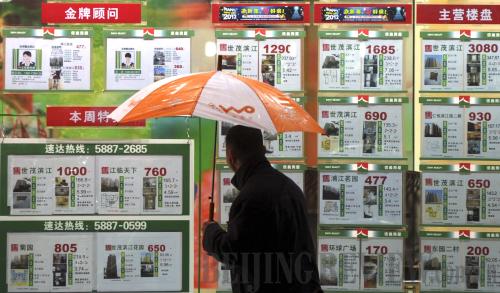|
 |
|
STILL INTERESTED: A man reads home sales information posted by a real estate agency in Shanghai (NIU YIXIN) |
MOHURD is also accelerating construction of affordable homes. The target for this year—7 million units—is lower than the 10 million units in 2011, but the actual construction area will be larger than last year.
Property tax is also likely to be introduced in cities with large investment proportions, or in the 40 key cities entered in the individual housing information database. On January 28, 2011, Chongqing and Shanghai became the first two pilot cities for property tax in China. After one year, the effect of this tax has been seen in Chongqing, with high-end housing consumption and the rapid rise of housing prices being curbed and the structure of housing supplies being optimized. People's concept of housing consumption has also begun to transform.
Chen Guoqiang, Vice President of the China Real Estate Society, said the regulation this year will continue to focus on curbing speculative investment, and the duration of controls will be decided by macroeconomic development and operations of the real estate industry.
Li Huiyong, a macroeconomic analyst of Shenyin and Wanguo Securities Co. Ltd., said in 2012 China will further improve the structure of the real estate market based on the regulation experience last year and consolidate regulation effects.
Wu Qilun, an independent financial commentator, said the focus of real estate control this year should be government responsibilities. According to Wu, real estate control can achieve effects not only through the proper regulation policies by the Central Government, but also effective implementation of the measures such as purchase limits and credit limits by local governments. "However, we have seen that some local governments are trying to figure out how resolute the Central Government is in enforcing regulatory measures, with some news of loosened purchase limit being released in some localities," Wu said. "Therefore to consolidate the effects of real estate control, the Central Government will inevitably strengthen supervision on local governments to fully implement the regulation measures and sternly prevent any local government from loosening the controls."
Wu said this year China should continue to push local governments to build affordable homes, formulate an accountability system of real estate control and punish administrative officials and officials in charge of the real estate industry in localities that fail to realize the target of controls.
"It is unlikely that real estate loans will grow rapidly this year, and real estate credit will be tight," said Zhu Daming, Vice Chairman of the National Real Estate Manager Alliance under the All-China Federation of Industry and Commerce.
Zhu said the reason for the tight credit in the real estate market this year is that property prices have reached a peak, and it is unrealistic, at least in the first half of this year, to reverse the market just relying on purchasing power when there is no strong growth of new real estate loans.
According to Zhu, although growth of total real estate loans is dropping, the proportion of loans for affordable housing development will rise. Growth of affordable housing investment will pressure developers of commercial housing to bring about a reasonable correction in housing prices.
According to a report recently released by the Center for Forecasting Science of the Chinese Academy of Sciences, in 2012 the average property selling prices are estimated to drop 5.3 percent year on year.
The banking industry is also concerned about property price declines. At a central bank conference on risk management against the real estate industry held at the end of November 2011, a report written by the central bank's statistics and analysis department was discussed, which said property prices will begin to drop with slowed growth of both real estate development investment and newly granted loans. The report said some representatives from commercial banks thought banks and real estate developers could stand the impact of a 20-30 percent decline of property prices, but what the central bank is more concerned about is whether panic selling and other chain reactions will be induced.
Email us at: lanxinzhen@bjreview.com | 